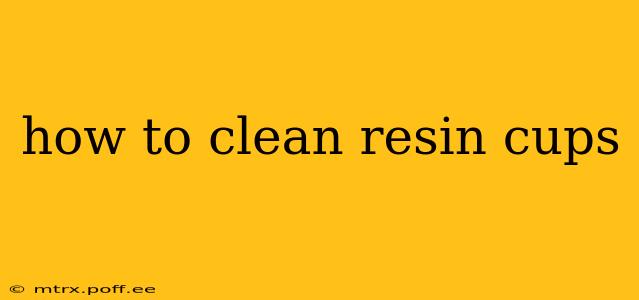Resin crafts are incredibly popular, offering a versatile and durable material for creating stunning pieces. However, the process often leaves behind sticky residue or lingering smells on your cups and tools. Cleaning resin cups properly is crucial for maintaining their longevity and ensuring your next project starts clean. This comprehensive guide will cover various cleaning methods to suit different resin types and levels of residue.
What Type of Resin Are You Using?
Before we dive into cleaning methods, it's crucial to understand the type of resin you're working with. Different resins require slightly different approaches. Knowing the type—epoxy, polyester, polyurethane, etc.—will help you choose the most effective cleaning method. The manufacturer's instructions are always the best starting point.
How to Clean Resin Cups After Pouring: Immediate Cleanup
The key to easy cleaning is acting quickly. The longer resin sits, the harder it becomes to remove.
1. Immediately after pouring:
- Wipe down excess resin: Use paper towels or lint-free cloths to wipe away any spilled or excess resin before it cures. This prevents it from hardening and becoming difficult to remove.
- Rinse with isopropyl alcohol (IPA): For most resins, a quick rinse with 91% or higher isopropyl alcohol (IPA) will effectively dissolve uncured resin. Make sure to wear gloves and work in a well-ventilated area.
How to Clean Resin Cups with Hardened Resin: Tackling the Tough Stuff
If you've let resin harden in your cups, don't despair! Several methods can help remove stubborn residue.
2. Soaking and Scraping:
- Soak in warm soapy water: For less stubborn residue, soak the cups in warm, soapy water for several hours or overnight. This can soften the resin, making it easier to scrape off.
- Scrape with a plastic scraper: After soaking, use a plastic scraper (a butter knife or a dedicated resin scraper works well) to gently remove the softened resin. Avoid using metal scrapers, as they can scratch the cups.
3. Acetone for Epoxy Resin (Caution!):
- Acetone is a powerful solvent: Acetone can effectively remove hardened epoxy resin, but it's crucial to use it cautiously. It's highly flammable and should be used in a well-ventilated area, away from open flames. Always wear gloves and eye protection.
- Test in an inconspicuous area: Before applying acetone to the entire cup, test it on a small, hidden area to ensure it doesn't damage the cup material.
4. Using a Drill and Drill Bits (for extreme cases):
- Only for very stubborn resin: If all else fails, and the resin is extremely hard and bonded to the cup, you might consider using a drill with a small drill bit to carefully chip away the hardened resin. This is a last resort and requires extreme caution to avoid damaging the cup. Practice on a scrap piece of similar material first.
How to Clean Resin Cups: Addressing Specific Issues
How do I remove sticky residue from resin cups?
Sticky residue is often caused by uncured resin. IPA is your best friend here. Soak the cups in IPA for a period of time, then try scraping with a plastic utensil. If the residue persists, try a slightly stronger solvent such as acetone (with appropriate safety precautions).
How do I get rid of the smell of resin from my cups?
The smell of resin can linger. Thorough cleaning with IPA or acetone usually helps, but for persistent odors, consider letting the cups air out in a well-ventilated area for several days. You can also try placing them in the sun (not direct sunlight), which can help dissipate the smell.
What is the best way to clean silicone resin cups?
Silicone cups are generally quite easy to clean. The methods described above—immediate wiping, soaking, and scraping—work well. Silicone is flexible, so you might find that gentle bending or flexing helps release hardened resin. Avoid using abrasive cleaners or scrubbers that could scratch the silicone.
Can I use dish soap to clean resin cups?
While dish soap can help remove some residue, it's not effective on hardened resin. It's best used in conjunction with other methods, such as soaking and scraping.
Maintaining Your Resin Cups
Regular cleaning and careful handling will significantly extend the life of your resin cups. Always clean them immediately after use to prevent resin from hardening. Proper storage in a clean, dry place will also help keep them in good condition.
By following these cleaning methods, you can keep your resin cups clean and ready for your next creative project. Remember always prioritize safety by wearing appropriate protective gear and working in a well-ventilated area.
